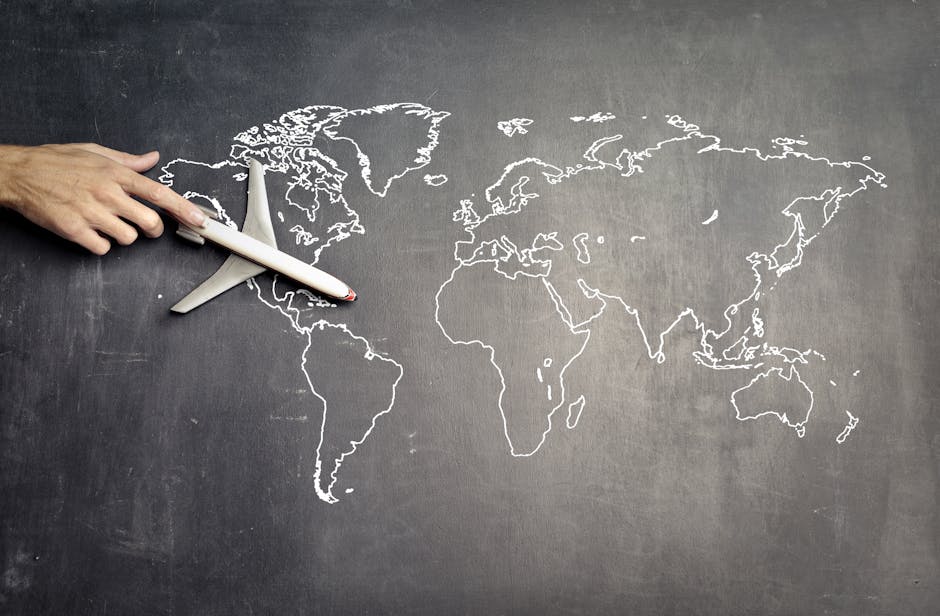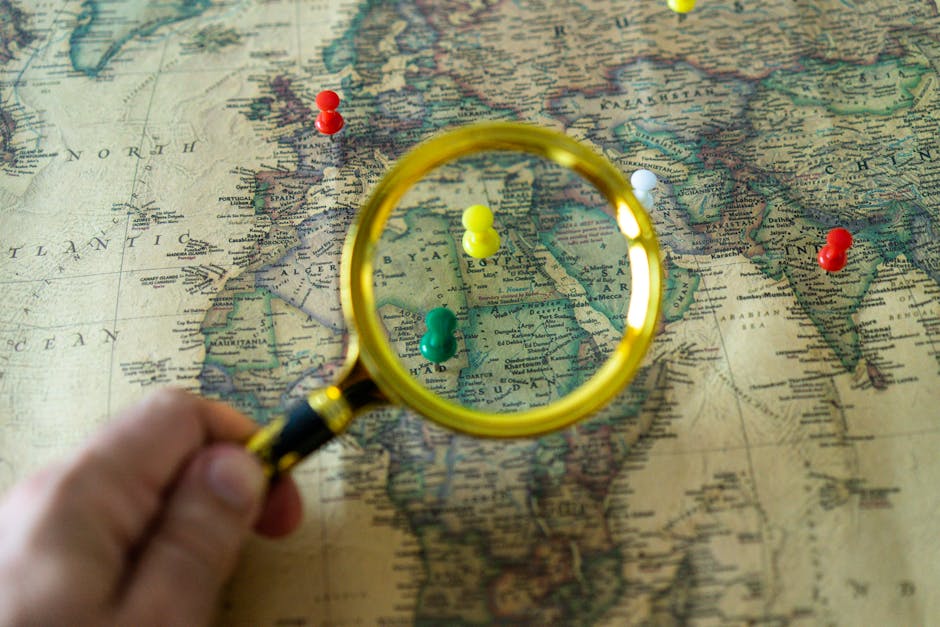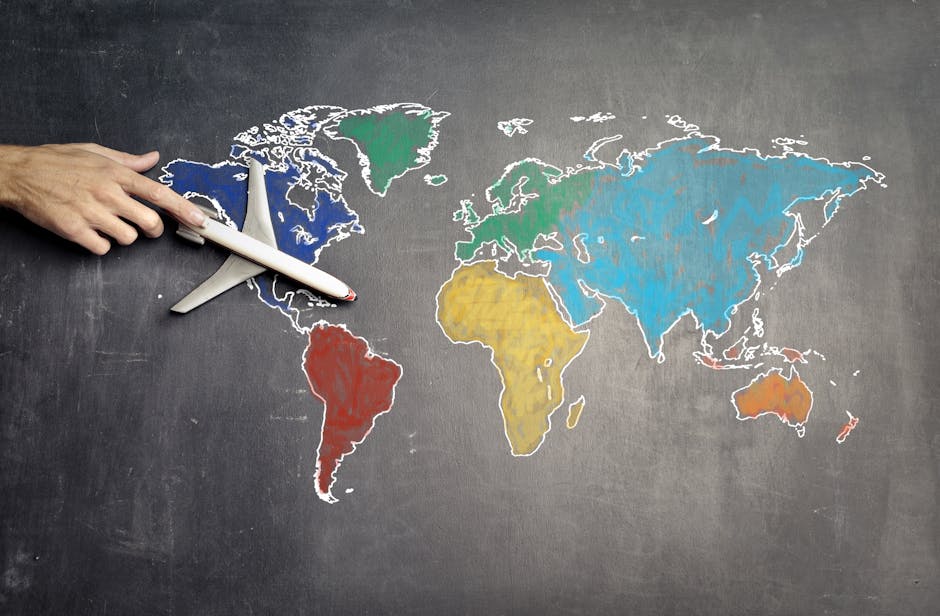Traveling the world for an extended period of time is a dream for many, but the question that often arises is how much will it cost? While the answer may vary depending on individual preferences and travel styles, it is vital to plan and budget accordingly. In this blog post, we will explore the various factors that contribute to the overall cost of traveling the world for six months. From transportation and accommodation to food and activities, we will delve into the details to provide you with a comprehensive understanding of the potential expenses involved. By gaining insight into the costs associated with long-term travel, you can better prepare for your journey and make informed decisions to ensure a memorable, yet affordable, experience. So, let's dive into the main considerations when estimating the budget for your dream trip around the world.
- Importance of budgeting for long-term travel

When embarking on a long-term travel adventure, budgeting becomes a critical aspect that must not be overlooked. It is essential to have a clear understanding of the financial implications and plan accordingly to ensure a smooth and successful journey. Budgeting for long-term travel provides several important benefits that can help make the experience more enjoyable and less stressful.
One of the key advantages of budgeting is that it allows for a realistic assessment of how much money is needed for the trip. By carefully considering all expenses, such as flights, accommodation, transportation, meals, activities, and unforeseen costs, travelers can estimate their total expenditure for the entire duration of their journey. This knowledge helps in setting a reasonable goal for saving and ensures that funds are allocated appropriately.
Budgeting also enables travelers to prioritize their expenses based on their personal preferences and priorities. By establishing a breakdown of costs for different aspects of the trip, individuals can identify areas where they can potentially save more or find more economical alternatives. This allows them to tailor their experience to their specific interests and make the most of their available resources.
Furthermore, budgeting empowers travelers to actively manage their finances throughout their journey. It helps them track their spending, identify potential areas of overspending, and make necessary adjustments when required. By monitoring their expenses and being mindful of their financial limitations, travelers can avoid unnecessary stress and unplanned financial burdens.
In addition to the financial aspects, budgeting also allows individuals to have a realistic perspective on the duration of their trip. By carefully considering the costs involved, travelers can determine the optimal length of their adventures and make choices accordingly. This ensures that they can sustain their travels without exhausting their funds prematurely.
Lastly, budgeting instills a sense of financial responsibility and discipline, which is valuable not only during travel but also in other aspects of life. By learning to manage and allocate funds wisely, individuals develop skills that can be applied to their personal and professional lives. Additionally, effective budgeting during long-term travel builds a foundation for future financial planning and the ability to achieve other goals.
In conclusion, budgeting is of utmost importance when planning for long-term travel. It provides a realistic understanding of the necessary expenses, allows for personalization of the travel experience, enables active financial management, helps in determining the optimal duration of the journey, and fosters financial responsibility. By investing time and efforts into budgeting, travelers can ensure that their long-term adventures are not only memorable but also financially sustainable.
- Common misconception regarding the cost of long-term travel

Many people dream of traveling the world for an extended period of time, but often, their plans are halted due to a common misconception: the belief that long-term travel is unaffordable. However, this notion couldn't be further from the truth. With careful planning and smart budgeting, it is very much possible to embark on a 6-month journey around the globe without breaking the bank.
One of the most common misconceptions regarding the cost of long-term travel is that it is reserved for the wealthy elite or trust fund babies. This stereotype often deters individuals with modest incomes or those looking to pursue a more budget-conscious adventure. However, the truth is that anyone can travel the world for an extended period of time, regardless of their financial background.
Another misconception is that long-term travel requires a massive upfront investment. While it's true that there are initial costs involved, such as flights and travel insurance, these expenses can be managed and minimized through careful planning and research. By utilizing budget airlines, redeeming frequent flyer miles, and being flexible with travel dates, you can significantly reduce your transportation costs.
Accommodation is another area where travelers often overestimate their expenses. While luxury hotels can be pricey, there are plenty of budget-friendly accommodation options available. From hostels and guesthouses to homestays and house-sitting opportunities, there are countless ways to find affordable and comfortable places to stay during your journey.
Food costs can also be a concern for many long-term travelers. However, eating out for every meal is not only expensive but can also hinder your ability to immerse yourself in the local culture. Opting for street food, local eateries, and self-catering can greatly lower your food expenses while providing memorable and authentic culinary experiences.
Lastly, there is a misconception that long-term travel requires a significant sacrifice in terms of comfort and safety. While it's true that traveling on a budget often means making some compromises, it doesn't mean sacrificing your well-being or personal preferences. With proper research and planning, you can find affordable and safe destinations, choose reliable transportation options, and make informed decisions to ensure your journey is both enjoyable and secure.
In conclusion, the common misconception that long-term travel is unaffordable is simply not true. With proper planning, budgeting, and a bit of flexibility, anyone can embark on a 6-month adventure around the world without breaking the bank. It's essential to dispel these misconceptions and inspire more people to explore the world, knowing that their dreams of long-term travel are within reach.
Factors influencing the cost of travel

Factors Influencing the Cost of Travel
When it comes to embarking on a six-month journey around the world, one of the first questions that may come to mind is, "How much will it cost?" While there is no one-size-fits-all answer to this question, as travel expenses vary greatly depending on personal preferences and circumstances, there are several key factors that can significantly influence the overall cost of your global adventure.
1. Destinations: The countries and cities you choose to visit will greatly impact your budget. Popular tourist destinations tend to have higher accommodation and food costs, while less-visited or off-the-beaten-path locations can offer more affordable options. Researching and selecting destinations with a lower cost of living can help stretch your travel funds.
2. Seasonality: The time of year you decide to travel can also affect your expenses. Peak tourist seasons, such as summer and major holidays, often mean higher prices for airfare, accommodations, and attractions. On the other hand, shoulder or off-peak seasons can offer better deals and less crowd, allowing you to save money.
3. Accommodation: The type of accommodation you choose plays a crucial role in your travel expenses. Staying in luxury hotels will likely increase your overall cost, while opting for budget accommodations, such as hostels, guesthouses, or even homestays, can significantly reduce your daily expenses. Platforms like Airbnb and Couchsurfing can provide affordable alternatives as well.
4. Transportation: How you choose to get around can also impact your travel budget. Flying between destinations can be expensive, especially for long-haul flights. Consider alternative options like overland travel, intercity buses, or trains, which can be more cost-effective. Local transportation, such as public buses or trains, are usually cheaper than taking taxis or renting a car.
5. Meals and Dining: Dining can be a significant expense during your trip. Opting for street food, local restaurants, and markets can be more budget-friendly than eating at tourist hotspots or fine dining establishments. Additionally, self-catering can save you money by preparing meals yourself or having picnics.
6. Activities and Attractions: Engaging in activities and visiting attractions is a crucial part of any travel experience, but it can also add up financially. Prioritize the activities that interest you the most and consider exploring free or low-cost options, such as public parks, museums with discounted admission, or local festivals.
7. Exchange Rates and Money Management: The exchange rates between your home currency and the countries you visit can have a significant impact on your expenses. Stay updated on exchange rates and consider the timing of your purchases or currency exchange. Additionally, managing your money wisely by using budgeting apps or researching the best ways to access your funds can help you save on transaction fees and minimize currency conversion costs.
Remember, while these factors can influence the cost of your travel, your personal spending habits and preferences will ultimately have the most significant impact on your expenses. By carefully considering these factors and making conscious choices during your trip, you can have a rewarding and affordable journey around the world.
- Destination choices

When planning a long-term travel adventure, one of the first decisions you'll need to make is where to go. With so many incredible destinations around the world, narrowing down your choices can be a daunting task. However, considering factors such as cost, safety, cultural experiences, and personal interests can help you make an informed decision. Here are some destination choices to consider for your six-month journey:
1. Southeast Asia: This region is a popular choice among budget-conscious travelers due to its affordability. Countries like Thailand, Vietnam, Cambodia, and Indonesia offer a vibrant mix of stunning landscapes, rich history, and diverse cultures. From exploring ancient temples to relaxing on pristine beaches, Southeast Asia has something to offer every traveler.
2. Europe: If you're seeking a more diverse experience with a mix of historical charm, cultural attractions, and stunning landscapes, Europe is a great option. While some countries in Europe can be more expensive, there are still many destinations that offer affordable options. Eastern European countries like Hungary, Poland, and Romania are known for their relatively low prices without compromising on beauty and charm.
3. South America: With its vibrant culture, breathtaking landscapes, and welcoming locals, South America is a dream destination for many travelers. Countries like Peru, Ecuador, and Bolivia offer a variety of experiences, from exploring ancient ruins such as Machu Picchu to trekking through the Amazon rainforest. South America also provides a good opportunity to learn and practice Spanish, as it's widely spoken in the region.
4. Southeast Africa: For those seeking a unique and adventurous experience, countries like South Africa, Tanzania, and Kenya offer incredible wildlife encounters, stunning national parks, and breathtaking landscapes. While costs can vary depending on the type of accommodation and activities you choose, it's possible to explore this region on a reasonable budget.
5. Oceania: If you've always dreamt of exploring the stunning landscapes and vibrant underwater ecosystems of the Pacific, countries like Australia and New Zealand should be on your list. While these destinations may be slightly more expensive, opportunities for outdoor adventures, cultural experiences, and breathtaking natural wonders make them worth considering.
Remember, each destination has its own unique appeal and cost considerations, so it's important to research and compare prices for accommodation, transportation, and daily expenses. It's also a good idea to consider the local currency exchange rates and the right time to visit to make the most of your budget. By carefully selecting your destinations based on your interests, budget, and safety, you can ensure an unforgettable world travel experience.
- Accommodation options

When embarking on a long-term travel adventure, one of the most significant expenses to consider is accommodation. Thankfully, there is a wide range of options available to suit various budgets and preferences. Here are some popular accommodation choices for travelers looking to explore the world for six months:
1. Hotels: Hotels provide comfort and convenience, guaranteeing a pleasant stay in different cities around the globe. However, they often come with a higher price tag, especially in popular tourist destinations. Consider booking in advance or using loyalty programs to secure discounts and special offers.
2. Hostels: Hostels are a favorite among budget travelers, offering affordable shared dormitories or private rooms. They are ideal for socializing and meeting fellow travelers while keeping costs low. Some hostels also provide communal kitchens, allowing guests to cook their meals and save further on dining expenses.
3. Airbnb: A popular choice for travelers seeking a home-away-from-home experience, Airbnb offers a variety of accommodation types, ranging from shared rooms and apartments to unique stays like boats or treehouses. Depending on the destination, renting an entire apartment can be more cost-effective than booking hotel rooms.
4. Vacation Rentals: Similar to Airbnb, vacation rentals provide an array of options including houses, villas, or vacation apartments. These rentals are usually managed by property owners or agencies, allowing guests to enjoy more space, privacy, and a more authentic local experience.
5. Guesthouses: Guesthouses, often run by locals, can be found in many parts of the world. They offer a more intimate and personalized experience compared to hotels and are usually less expensive. Guesthouses are especially common in countries that attract backpackers, such as Southeast Asia and South America.
6. Couchsurfing: For the adventurous and sociable travelers, couchsurfing is an excellent option. This platform connects travelers with locals who are willing to offer a free place to stay. It provides a unique opportunity to immerse oneself in the local culture and forge meaningful connections while keeping expenses to a minimum.
7. Work Exchanges: Work exchange programs allow travelers to stay in accommodation for free or at a significantly reduced cost in exchange for a few hours of work each day. Websites such as Workaway or HelpX connect volunteers with hosts worldwide, providing an excellent opportunity to experience different cultures while contributing to the local community.
When planning your six-month journey around the world, carefully consider your accommodation options, taking into account location, pricing, and personal preferences. By choosing the right type of accommodation, you can make the most of your travel budget without compromising comfort or your sense of adventure.
- Transportation expenses

When planning a trip around the world for six months, one of the major expenses to consider is transportation. Traveling from one destination to another can easily eat up a significant portion of your budget, but with careful planning and smart choices, you can minimize these costs.
1. Flights: Long-haul flights can be the most expensive part of your travel budget. To save money, consider booking your flights well in advance or keeping an eye out for flight deals. Be flexible with your travel dates and consider flying on weekdays, as they are generally cheaper than weekends. Additionally, consider alternative airports or layovers to find more affordable options.
2. Train and bus fares: While flying is often the fastest way to travel between countries, it may not always be the most cost-effective. In Europe, for example, train and bus travel are popular and budget-friendly options. Look for rail passes or bus companies that offer discounted tickets for multiple destinations or consider taking overnight trains or buses to save on accommodation costs.
3. Local transportation: Once you arrive at your destination, you'll need to get around locally. Research the public transportation options available, such as buses, metros, or trams, and consider purchasing weekly or monthly transportation passes if they provide good value for money. For shorter distances, explore walking or biking, which not only save on costs but also allow you to experience the places more intimately.
4. Rental vehicles: In some cases, renting a car or motorbike might be necessary or more convenient, especially in rural areas or destinations with limited public transportation. Compare prices from different rental companies, and don't forget to take into account additional costs such as fuel, insurance, and parking fees. Additionally, ensure that you understand the local traffic regulations and have the necessary permits or licenses to drive.
5. Inter-city transportation: Moving between cities within a country or a region can also add up quickly. Research different options like shared taxis, ridesharing services, or local minivans to find the most cost-effective ways to travel. In certain destinations, booking through local tour agencies or joining group tours could also help reduce costs, as they often provide transportation between attractions or cities as part of the package.
Remember, when budgeting for transportation expenses during your six-month travel adventure, it is crucial to have a clear understanding of the destinations you plan to visit and the modes of transportation available. This will enable you to make informed decisions and allocate funds accordingly while keeping your overall travel experience enjoyable and affordable.
- Food and drinks

When it comes to planning a long-term trip around the world, one of the most important aspects to consider is the cost of food and drinks. Exploring different cuisines and indulging in local delicacies can be a highlight of your travel experience, but it's crucial to budget wisely to ensure your money stretches as far as possible.
The cost of food and drinks can vary significantly depending on your destination. In some countries, like Southeast Asia or certain parts of Africa, you'll find inexpensive street food stalls and local eateries that offer tasty and affordable meals. On the other hand, European or North American cities tend to have a higher cost of living, meaning that dining out or grabbing a coffee can quickly add up on your expenses.
To keep your food and drink budget in check while traveling, consider a few strategies. Firstly, opt for eating at local markets or food stalls where the prices are usually more affordable compared to restaurants. This way, you can taste the amazing flavors of the region while enjoying a variety of dishes without breaking the bank.
Another way to save money on food is by embracing the art of self-catering. Look for accommodations with kitchen facilities or rent an apartment, allowing you to cook your meals using fresh local ingredients. Not only will this help minimize your expenses, but it can also be an opportunity to immerse yourself in the local culinary culture by shopping at local markets and learning traditional recipes.
If eating out is a non-negotiable part of your travel experience, be selective and do research beforehand. Look for recommendations from locals or fellow travelers on affordable yet delicious places to eat. Often, the best restaurants are the hidden gems tucked away from the touristy areas and may offer more authentic and reasonably priced meals.
It's also worth mentioning alcoholic beverages in the context of travel expenses. Drinking can significantly impact your budget, especially in countries with high alcohol taxes and touristy areas where prices are inflated. Consider limiting your alcohol consumption or enjoying happy hour deals and specials at local bars to save some money.
Overall, while food and drinks can be a significant expense during long-term travel, there are various ways to manage your budget without compromising your experience. By being mindful of where and what you eat, exploring local markets, and occasionally cooking your own meals, you can savor the flavors of the world while staying within your financial limits.
- Visa fees and travel insurance

Visa Fees and Travel Insurance
When planning a long-term trip around the world, it is essential to consider the costs associated with visas and travel insurance. These expenses are crucial in ensuring a smooth and hassle-free journey.
Visa fees can vary significantly depending on your destination and nationality. It's important to research the visa requirements for each country you plan to visit and factor in the cost of obtaining the necessary permits. Some countries offer visa-free access or visa on arrival for certain nationalities, while others may require advance applications and payments. These fees can add up, especially if you plan to visit multiple countries during your six-month adventure.
In addition to visa fees, travel insurance is a must-have when embarking on such an extensive journey. It provides financial protection and peace of mind in case of unexpected emergencies, such as medical expenses, trip cancellations, or lost luggage. The cost of travel insurance varies depending on factors such as your age, the length of your trip, the level of coverage, and any pre-existing medical conditions you may have. It is essential to carefully review different insurance plans and choose one that suits your needs and budget.
While visa fees and travel insurance may seem like additional expenses, they are crucial investments to ensure a safe and worry-free travel experience. It is always better to be prepared and have the necessary documentation and protection in place before setting off on your adventure.
Remember to factor in these costs when planning your travel budget and consider them as essential components of your overall expenses. By doing so, you can enjoy your journey to the fullest and minimize any unexpected financial burdens that may arise along the way.








